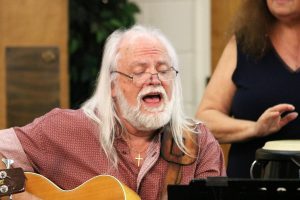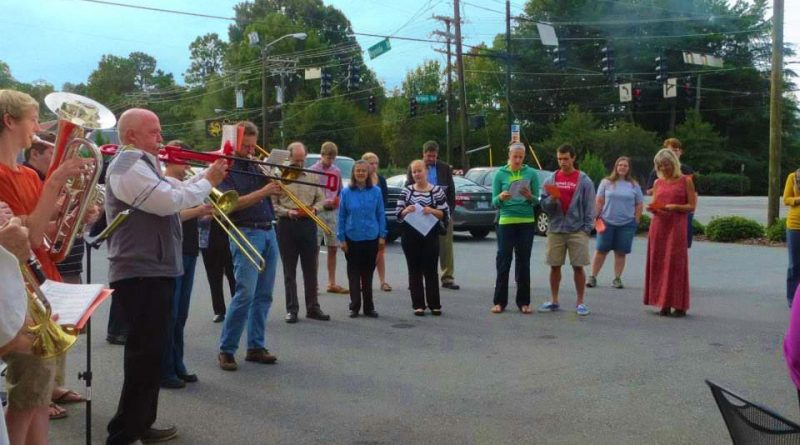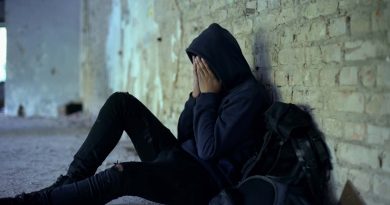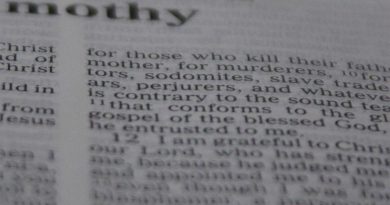My View on Homosexuality
By the Rev. Brad Bennett
Author’s Note: This a sermon or reflection offered at a Come & Worship gathering on a Sunday morning in September of 2015. For a pastor, telling one’s congregation of one’s view on controversial issues can be dangerous, but I hoped C&W would be receptive (they were). I just wanted them to know where I was (and how I got there), and hoped that it would spur a more honest dialogue instead of defensive power posturing for whatever side. In the C&W context, I think it worked.
James 5:13-20, Mark 9:38-50
Today is the last Sunday that we hear from James for a while. We’ve heard some pretty provocative stuff from him over the last several weeks, and James offers very practical approaches in his reflections of faith on how Jesus’ followers should relate to one another and to others beyond. Today is no different even though I would say that reading this passage too superficially could lead one to think of prayer as some kind of magic formula. Perhaps a simple way of looking at it would be a take on the old family billboard adage – the family that prays together stays together. Yep, definitely simplistic, but in a way James is saying something similar – the church that prays together stays together!
Simplistic, too, but perhaps he is presenting a basis that is strong enough to weather most any storm. Confessing to one another and praying for one another can go a long way in healing any wounds that may exist in the community.
We still have a few Sundays left in Mark until the next cycle in the Lectionary moves us to a different gospel. Mark, too, has been quite provocative in his portrayals of Jesus and his struggles with coming to terms with his identity, as well as Jesus helping his followers understand that following him may not be quite the earthly picnic that they were hoping it might be. Today, Jesus again stuns his disciples with very clear if not gruesome illustrations about not hindering others in their faith journeys – not being a stumbling block in the way of other believers. And if something of yours causes you to stumble, it’s better to amputate it than to keep it to where it drags you down to where there is no return.
I thought that these two passages might be a good back drop for my doing something a little different today. You have printed on your bulletin the next step in what is considered by the Southern Province of the Moravian Church as “Conversations Regarding Homosexuality and the Church.” At the 2014 synod of the Moravian Church Southern Province “Resolution 12” was adopted which called for “resources and a process for a conversation about homosexuality in the church that includes diverse viewpoints, and opportunities for open and honest discussion, study and discernment.” As you well know homosexuality is a hot topic in our society as well as in religious circles and has quite diverse viewpoints.
As a denomination we are little late in the game with this and perhaps we’d have been better served to have begun this process a long time ago.
I think as a denomination we are little late in the game with this and perhaps we’d have been better served to have begun this process a long time ago before all the big news controversies with court decisions on marriage and who can do or not do whatever because of a strongly held belief. But then again it’s difficult anytime to talk about something that most people have a hard time understanding in the first place since they may have no frame of reference or have not really encountered it as it is outside of what is considered by most as “normal” and accepted – and when we encounter something we don’t understand, it’s easy (especially these days) to be blasted with all kinds of stuff over media sources trying to convince us of this perspective or that by often very inflammatory means. And we’re getting a LOT of that by both ends of the spectrum! And little of it is thoughtful, helpful, or hopeful. Most of it is in the manner of a club – that is, trying to club somebody else into submission to their way of thinking and painting the other side as unchristian or evil!
So I can appreciate our province’s approach calling for “conversations” and not battles. “Tis a Pleasant Thing to See: Fostering Respectful Conversation, is the title of this forum. ‘As called for by the 2014 Synod, the Southern Province is engaging in a period of study and discernment regarding homosexuality and the church from biblical, theological, and pastoral perspectives. Our conversations take place in an environment of mutual respect, courtesy, and love for one another as brothers and sisters, even as we find ourselves differing in our thoughts and feelings.” Very different from how it seems to be taking place in the public arena.
So I can appreciate our province’s approach calling for “conversations” and not battles.
When I read that, I kind of felt like it described us, in at least what I hope we are here as a community. Our propaganda over there talks about our being a safe, inviting, relaxed and open atmosphere for worship and fellowship. It talks about hospitality, it talks about walking in faith with God in all its opportunities as well as challenges and uncertainties. It says we are inclusive of people in as wide a realm as possible, affirming differences. It says we’re not liberal or conservative, that that sort of stuff is less important than our unity seen in the person and work of the Savior in faith, hope and love.
So I wondered if you wonder where I might be on all this talk on homosexuality. And I wondered if it might be good to tell you! Reflections or sermons and the like are supposed to in whatever way declare the Good News of Jesus Christ. I hope this does because whatever I might think or anybody else for that matter should always be expressed under the umbrella of a God who loves us enough as imperfect and fallen human beings, under the umbrella of a God who expressed that love through the life, death and resurrection of Jesus as my savior as well as yours, too. Any such reflection or conversation to be helpful as Christians has to be done in and with such love all around whatever the perspective.
So here goes. I don’t do this to push how I see it or to say this is right way to look at it or I’m right. Nor am I asking you to agree with me or to think like I do. I offer it in the spirit of these conversations and thinking that you might want to know and that perhaps here we can be a community that truly does put first our relationships with the savior and each other above whether we see everything the same way. My perspective comes not so much from some intellectual decision making process or from what somebody has told me I should have; it is from my own experiences over the years, and my own observations and study. It could be maybe this is something we can talk about together after worship next Sunday in “Sunday School.”
They talked about loving others but if you were talking about black people, that was a different matter.
As you know I grew up in the turbulent 60s. That has I admit colored the way I see a lot of things. I think I’ve mentioned before that the Moravian church where I grew up talked a lot about loving people and all that, but they were also the church that moved out of northeast Winston-Salem in the 60s when the economic standards and the demographics of that neighborhood were changing, to the other side of town onto Silas Creek Pkwy which was quite the opposite economically and racially. They talked about loving others but if you were talking about black people, that was a different matter. I think I’ve told you about my wanting to see for myself this race thing so in the 7th grade when I was assigned to a Jr high school that had a lot of black people, I did! And that as far as I could tell, the main difference was their skin was darker than mine. I didn’t get all the fear that I was hearing from religious people about people of color. That did affect my developing faith as to how far God’s love reached and raised a red flag when I saw so many in my church saying one thing but then doing another. It wasn’t much different with Roman Catholics, Jews and more recently with others of different cultural backgrounds. They were all learning experiences that taught me that these “different” people that I was warned against, were mostly just people like me.
I don’t remember hearing much about homosexuality at that time, though I was increasingly aware of it – and often if mentioned around adults it was mostly a wide eyed unmentionable. It was clearly seen as wrong, something you shouldn’t even talk about but rather fear and was treated like one evangelist at that time on TV dubbed – “a homosexual man would just as soon shoot you as look at you.” Danger! Danger!
Again, I had no realm of personal experience in terms of homosexuality and at that time my experience was mostly overshadowed by the racial tensions of the day.
But once I got to college that changed. I was well into the peace, love & rock n roll in matters of life and faith, so when it began to trickle around the dorm that there were a couple of “gay” students around, my interest went up. The whispers were all about, “Did you hear that… is gay? He likes GUYS. GAG!” or some such. I’m not homosexual so in some ways I could concur. But I watched, much like I did with black people some years earlier. I had conversations with them. While I couldn’t get the “liking other guys” bit they seemed pretty normal, much like everybody else and not necessarily like the developing gay stereotype.
They did not fit any gay stereotype – they weren’t flamboyant, promiscuous, weird, at least no more so than many heterosexual people I knew.
One guy was a body builder and wasn’t effeminate or some such. They never tried to shoot me. Or pick me up. From college and on into my adult years I have been friends with people both male and female who have turned out to be gay. Church people as well as those who were not. These people were not people who fit any gay stereotype either – they weren’t flamboyant, promiscuous, weird, at least no more so than many heterosexual people I knew. And in my conversations with some of them over the years, their struggle with their “sexuality” went way back, and if there was any choice involved, it was choosing to be “straight” because that was what was expected. And it got to the point for some of them that the physical, emotional and spiritual conflict it caused within to have chosen to be something other than what they were was so great that they would rather try to do themselves in than deal with the fact that they knew they were different. They were trying to be “normal” having wives/husbands/children and just couldn’t do it anymore. It wasn’t like choosing between Coke or Pepsi. I don’t and can’t understand what that must be like. I’m not a scientist, but what I’ve learned by study is that this homo/heterosexual thing isn’t always 2 extreme poles – sometimes you aren’t just one or the other. Our physiology is still not well understood scientifically, and sometimes instead of being here or here, one is here. This isn’t true of most people, but it is true with some, which is why some could get married with someone of the opposite sex. It’s hard to understand. Nature can be very diverse and confusing.
So what about the Bible? I know what it says in the places that mention homosexual behavior when it is mentioned – and it isn’t mentioned positively, but then again neither is eating pork or shrimp, or trimming your beard. I also know that Jesus didn’t mention homosexuality at all but he did talk a lot about the way “sinners” and “outsiders” ought to be treated, and he modeled that in some very extraordinary ways for that time. I’ve read a number of books on homosexuality that unpack all this biblically and socially. It seems to me that whatever decision one wants to come up with in all this from a biblical perspective will ultimately depend on how one wants to read and interpret scripture, and how much weight one wants to put into this passage over that one. It isn’t crystal clear. So in many ways Biblically we are left with a puzzle and a challenge as to how we want to interpret the passages that are there, against other passages that are there, too, that could easily be construed in a very different direction.
Jesus didn’t mention homosexuality at all – but he did talk a lot about the way “sinners” and “outsiders” ought to be treated, and he modeled that in some very extraordinary ways for that time.
The official Unity statement from the worldwide Moravian Church says that the issue does not rise to the level of “Jesus Christ is Lord,” so no one is forced to agree or disagree about an issue like homosexuality because it isn’t considered an essential of faith as to how you see it. The essential is faith, hope and love so we are called to treat each other with those things, but it doesn’t mean we have to always see things the same way. We can’t forget that there are homosexual people who are already Christians and have always been a part of our churches.
So where does that leave me? Biblically I lean way more toward Jesus and how he treated “outsiders,” and figure God can be the judge of it all, not me. My experiences and my studies indicate to me that homosexual people are and can be as sinful as anybody else, and do fall under the same judgment by this God whose love through Jesus Christ goes to every length to redeem his lost and undone human creatures whoever they are – and I think that’s all of us. We’re all in the same boat. All of us are sinful. We are all in need of a Savior. Who am I to say who is more sinful because of this or that? I don’t think I can go beyond that.
So for me, should gay people be able to marry? I’m not sure they’d mess it up any worse than it’s already messed up. Should gay people be ordained? They already have been. The ones I know aren’t any better or worse as pastors because of it. Is simply being homosexual a sin? If it is, I have a hard time seeing God loving him or her any less than any other sinful human being because of it. Should we welcome a gay person here? I hope so as they are as much in need of love and grace as any of us.
Again, you don’t have to see it like I do, but I do hope that our community is strong enough to include differences in perspectives, understandings and opinions on whatever matters that come up when they occur and still be able to keep what is essential in the center. And I hope we are what our information back there says. I hope the Moravian Church can be strong enough Moravian Church will be strong enough to survive, too.

In the spirit of James I hope you will pray for all of us here. I hope you will pray for gay people and straight people for we are all in my view just people in need of a savior. I hope you will pray for the Moravian Church as it moves through a most difficult discernment process and that God will be ever present with all involved. And in the spirit of Jesus in Mark, I hope that we can remove from our hearts and minds anything that keeps us from loving and caring for our fellow human beings in whatever way we can whoever they are and wherever they are. We have enough stumbling blocks already.
The Rev. Brad Bennett is a retired Moravian pastor, and one of the founders of Come & Worship in Winston-Salem, NC. He is an accomplished guitarist. Photo by Charles Beamon.




